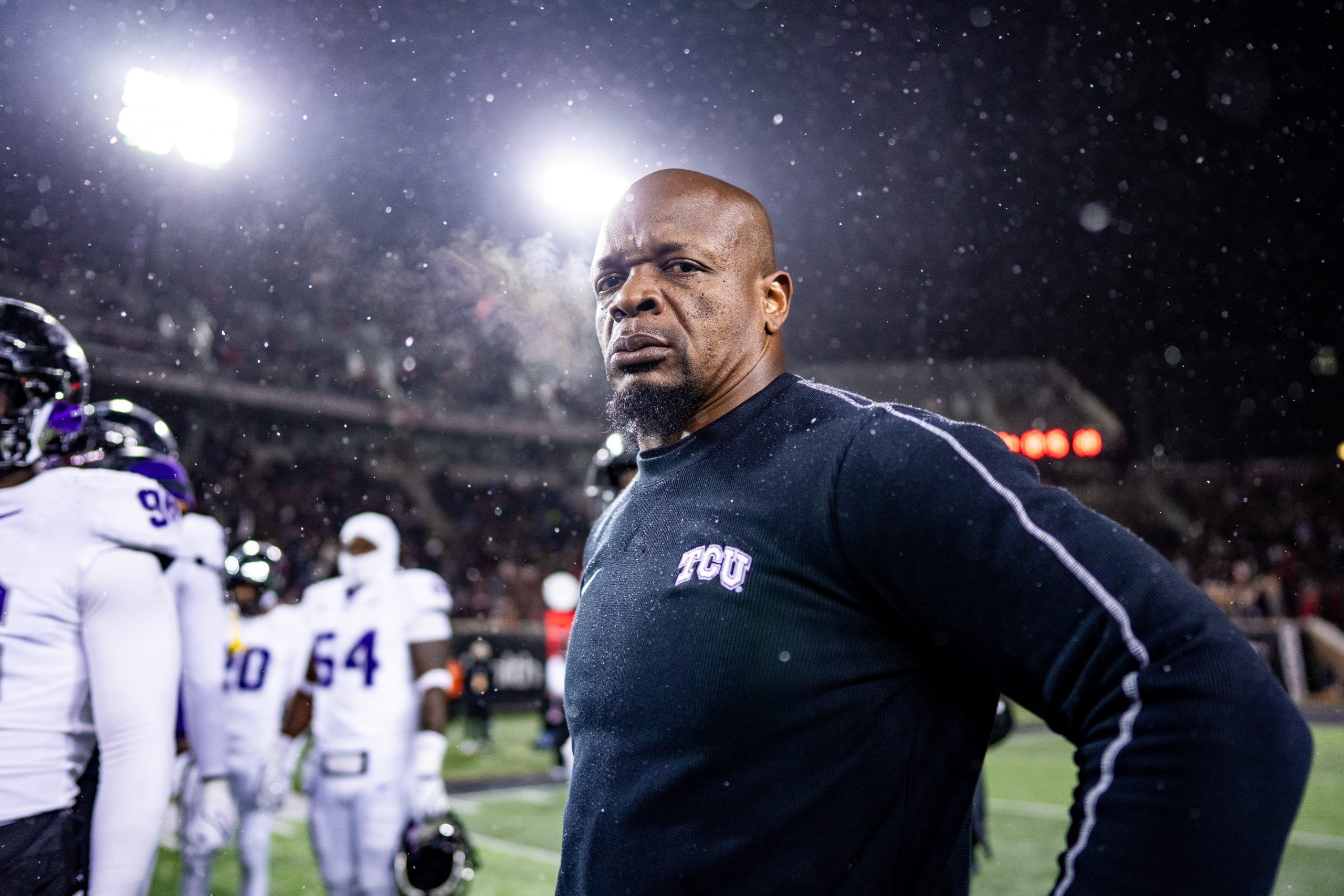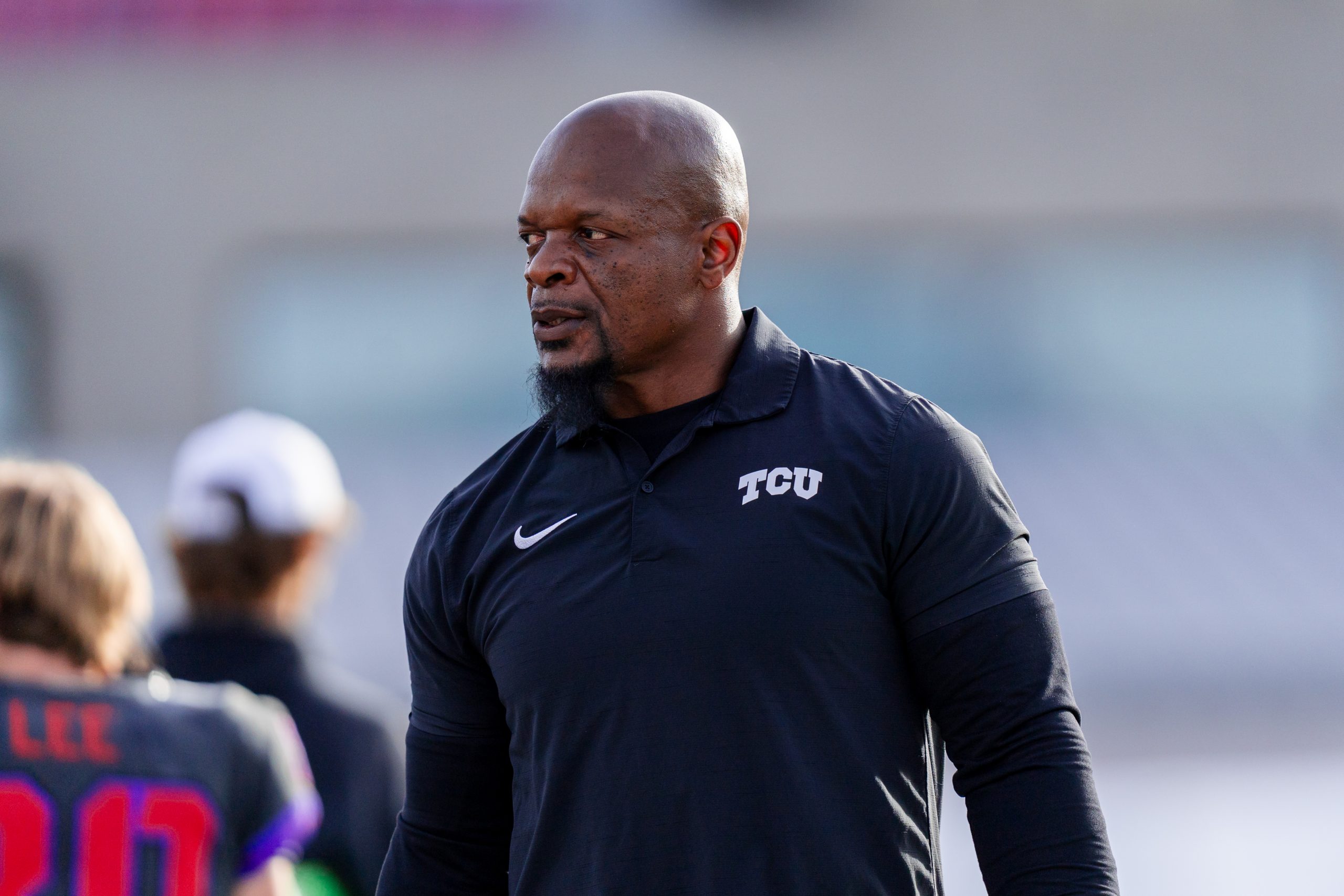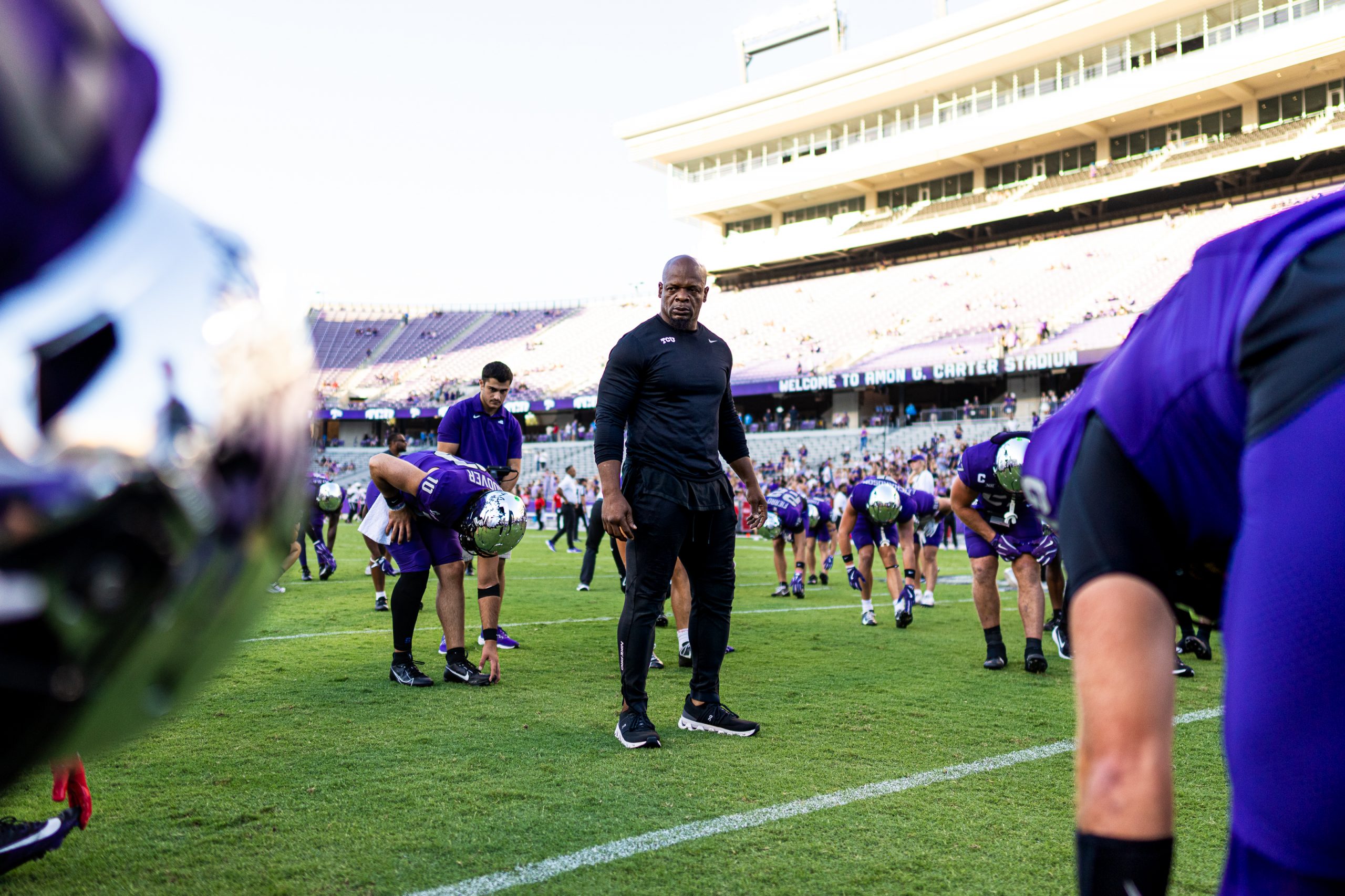Iron Man: Kaz Kazadi
The human performance specialist leads TCU Football’s strength and conditioning program into a new era.

Former NFL linebacker and longtime college coach Kaz Kazadi emphasizes family over fitness and football. Courtesy of TCU Athletics
Iron Man: Kaz Kazadi
The human performance specialist leads TCU Football’s strength and conditioning program into a new era.
A career in college football is often one on the move. The path for Kaz Kazadi, who has served as TCU’s assistant athletics director for football human performance since 2021, is no exception.
Kazadi was a factor in the Horned Frogs’ run to the College Football Playoff National Championship game in his first full season in the position. But his experience stretches well beyond his 20 combined years in strength and conditioning.
After being named a semifinalist for the Butkus Award — presented annually to the top linebacker in the country — during his college playing days at the University of Tulsa, Kazadi had stints in the NFL and Canadian Football League.

Kaz Kazadi was a sixth-round draft choice of the St. Louis Rams in 1997, suiting up for 12 games that season before taking his talents to the Canadian and World football leagues. Courtesy of TCU Athletics
Kazadi then pursued a master’s in counseling psychology, treading into coaching as a graduate assistant before taking on roles with the Dallas Cowboys and Kansas City Chiefs. “It all made sense,” he said of the transition.
Approaching two decades since his pivot back to the college football ranks, Kazadi leads TCU Football’s strength and conditioning program. His duties take on added significance as the university prepares to unveil its state-of-the-art Human Performance Center Renovation and Expansion Projects.
You earned a bachelor’s degree from Tulsa in sociology with a psychology minor and completed a master’s degree in counseling psychology at Missouri. How has that education influenced your career?
Take a look at right now, 2025, and everything you’re doing with an athlete is neck up and between the ears, that voice that they hear in their head. Everything is about mentality and psychological health. That’s where you spend most of your time; that and trying to set up a program they can digest and understand.
Those degrees sound beneficial, but the most beneficial thing is being a parent and always thinking, “How would you want someone to treat yours?” Every young man and young woman who passes through here, we want to leave them that connection. Hopefully they feel like they were welcome in the building and they were supposed to be in the building. We’re going to say hello to every single person who comes to the weight room. We’re going to talk to every single person who walks in and every single person who walks out.
You worked for the Kansas City Chiefs and Dallas Cowboys before spending the past 15-plus years in college athletics. How does working with pro athletes compare with working with student-athletes?
I would say money makes everyone act a little strange. I think that’s the difference.
Once you give someone $100 million, that becomes an investment. And that investment needs to see the field. If you take a look at the Aaron Rodgers situation, the investment that the Jets made, the handling of that investment is critical.
The No. 1 rule: You do not injure athletes in the weight room. Do what you need to do, but you make sure that the talent is available. I think in college, in the past, the sheer numbers and how many people were there, I don’t know if that was necessarily a focus. But now, when the numbers are cut down with NIL, if we invest funds into an athlete, he needs to be available to perform. There are no bleachers in here to watch these guys train. There are no lights. ESPN is not here. FOX is not here. They need to be able to get to the game.
The football team won four straight games and six of seven to end the year. Does that reflect anything about the strength and conditioning program?
To me, it is indicative of the type of people you have, the types of guys and their commitment to each other. What it indicated to me was the passion they have for the sport and how they feel about each other and how competitive they are.
The football guys are wearing those shirts right now, and it says, “BLEAD PURPLE,” but it’s spelled with “Lead.”
I think people here are very passionate about purple and passionate about TCU, and that’s what I think the end of the season indicated.
What does success look like to you beyond wins and losses?
The only thing I can count as success is that they retain the tools, retain the information that we give them. When life strikes, just like life often does, they feel like they have a foundation and there’s the ability to bounce back from life and what it does to people.
“Every day is an interview. Every single interaction is an interview.”
Kaz Kazadi
You gotta be careful with the word success. Those are made-up concepts, success and failure. Those are not real. The person you spent time with for four or five years, have they developed the ability to bounce back after life happens? Once there’s tragedy, how do people respond? That’s all I’m looking at. Sometimes, you look up and there could be a scoreboard. Sometimes, there is no scoreboard.
Did I provide them with the ability to think critically? That’s it. I can’t be successful in any other way. I don’t really care how fast they ran or how much they lifted or anything. I know people hate to hear that. But how well did they respond to stress in life? Are they a good person? Can they raise a kid? It’s just that simple.
What’s the best piece of advice you would give to young professionals looking to break into the field of athletic performance?
Every day is an interview. Every single interaction is an interview. You’re determining whether you can maintain that post or whether you need to be elevated from that post or whether you need to move on from that post. You create your own reality every single day by the decisions that you make.
It’s important to know how to lose some arguments.
A lot of people will ask, “What’s your weakness?” My weakness is that I don’t care about my weakness. My weakness has never gotten me anywhere. I’ve never been hired for my weakness. So when people say, “What don’t you do well?” it’s a wild question to ask. It’s wild to make somebody say out loud what they don’t do well.
We can all improve on certain things, but there’s always something that, through time, separates you from everyone else. Can you identify what that is? If you can identify what it is that separates you from everyone else, don’t forget it and don’t let anybody let you forget it.

Kaz Kazadi, once a member of Sonny Dykes’ staff at SMU, enters his fourth season with the Frogs in 2025. Courtesy of TCU Athletics
The Human Performance Center will transform TCU Athletics, adding more than 30,000 square feet of new performance space — including upgrades to strength, nutrition, wellness and restoration facilities — for all 22 varsity programs. From a football standpoint, what excites you most about its capabilities?
The recovery center is a big differentiator. It’s about taking care of the individual after they train really hard. It’s giving them a space to get mentally balanced after competition.
There are going to be some features in there you won’t see anywhere else in the United States. And I think that speaks volumes to what the athletics department is about. It’s about the whole person, it’s not just about the athlete. It’s about mental health, it’s not just about physical health.
When you look at the football program, specifically, location and flow minimize stress. Being able to come in, park, get lunch, get breakfast, go to your meetings, come train and when it’s time to go practice, hit your locker room and flow right into the facility and flow right out to practice, I think those are big things. It’s centralized, and that’s a big advantage.
How does the center incorporate data and analytics into the operation?
I think that’s the way everything is going in athletics, leaning in toward the analytics area.
Athletics has been around long before analytics, right? You can’t forget the competitive nature and fundamentals of being an athlete. Analytics and data are important, but it’s there to support what the athlete is doing, to support what you’re asking them to do.
How do you anticipate the new human performance center affecting recruiting efforts?
I don’t know if you can use the word recruiting anymore when you take a look at the way athletics are changing. I think it’s all talent acquisition. I think it helps you acquire talent. I think recruiting is pre-name, image and likeness.
After you acquire talent, it helps you develop talent because it makes sense when you park one time and you can get your whole day done in the area. To a young brain, it makes sense: “I’m here to go to work. I signed an NIL deal.”
There are only 105 guys on the roster now because of the NCAA changes. So when I park in the parking lot, I’m going to work. And I think that helps develop talent you have.

Kaz Kazadi, center, spent time on staff with the Kansas City Chiefs and Dallas Cowboys before joining the college coaching ranks in 2007. Courtesy of TCU Athletics
And then once you’ve acquired talent, you’re developing it, I think it helps you retain talent because, again, you’re managing the entire person. You’re looking at a 360-degree approach.
You’ve got the nutrition department, which is benefiting the athlete because it’s giving them a positive side effect to all the stress they are being exposed to. And then they see the changes physically. They feel the improvement mentally. They feel like they’re connected, like part of a community, because all the other athletes are being supported, too.
Editor’s Note: The questions and answers have been edited for length and clarity.

Your comments are welcome
Comments
Related reading:
Features
An Epic Comeback
Three decades ago, dedicated alumni led a drive to rebuild TCU’s left-behind athletics program.
Sports: Riff Ram
Football Powerhouse
The 1930s were a golden age for TCU Football under legendary coach Dutch Meyer.
Sports: Riff Ram
Running It Back
Buoyed by experiences on and off the field, Savion Williams prepares for his final season at TCU.